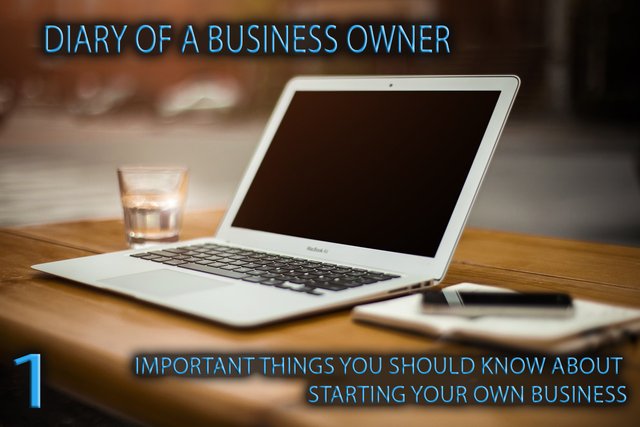
So you're frustrated at work. Or you're sitting at home and need to start getting some income flowing in. You're about to leave school and wondering if you should start your own business.
Whichever situation you're sitting this, if you're reading this then chances are that at some point you've thought of running your own business. Last year, I left my 15 year employment at local government council, that cushy safe job that promised a monthly salary, to start my own business. I had several reasons for doing so, some political, some discriminatory, some personal, but it is not the purpose of this article to discuss my reasons.
Today I want to talk to all of you who have considered or are considering starting your own business. Many of you probably haven't been on a business management course and wonders what it involves. Some of you might have business knowledge, but there are some things they just don't share with you that you learn when you start that business.
I would like to share with you my personal experience, without encouraging or discouraging you from starting one, but simply showing my point of view to help you make up your own mind.
MAKE SURE YOU'RE READY TO START YOUR OWN BUSINESS
For those of you who are considering leaving your current employment to start your own business, this is for you. As bad as that work is that you are currently doing, you need to consider this move very carefully. I was fortunate that my employer at that time allowed me to run my own business part-time in the evenings while I was working for them. This gave me time to establish myself in the publishing market for about a year before I decided it was time to do it full-time.
And even so, I should have waited another year until I was sure my business could sustain my finances consistently. There have been great months, and there have been very bad months, and no amount of planning can prepare you emotionally and mentally for those bad months.
If you know someone that is skilled at financial planning, sit down with them (or yourself) and plan what you need to make every month to cover your costs and your own personal income. You will need to plan for the income needed every month. I was fortunate at the start as my business didn't really need start-up funds to start making money. The problem became sustainability over the first six months until the funds started coming in by itself. This was when I knew I had established myself as a proper company. But it was something I should have waited for before I left my employer to run my business full-time.
ESTABLISH YOUR BUSINESS PLAN EARLY ON
In my years working for council, the one thing I have mastered is the Business Plan. Not only did they send me on courses for it early on, but I was involved not only at management level, but at Director and Executive Director level with the development of Business Plans. It was the one thing I didn't ask to specialise in, but that I was apparently extremely good at.
Or they just couldn't find some other poor old fool willing to do it.
Whichever reason it was, I really was good at it and understood the importance of it. It was one of the things that really made business sense to me. Establishing a Mission and Vision, determining your objectives, realising what your long and short term goals are, figuring out what your Strengths, Weaknesses, Opportunities and Threats are, determining your SMARTC principles...
Business Plans are powerful weapons in your company's arsenal. Not only is it important to you, but your financial clients and partners too. In order to get a business loan, the one thing they really want to see is your financial business plan, how you plan on making a return on investment, and how you plan on paying them back.
Now it isn't the purpose of this article to explain how to set one up properly (coming soon), but there are many resources online for that. But before you even think of starting your own business, do yourself a favour and create a business plan. It will really help you decide whether you really want to start your business or not.
DO YOU REALLY NEED TO REGISTER A BUSINESS?
This might sound like an odd question. What would you say if I told you that there are situations where you don't actually need to register your business?
The Companies and Intellectual Property Commission is South Africa's authority on companies and registrations. If you want to register a company, you have to go through them as the recognised authority.
According to their website, not all businesses need to be registered. When I was an author publishing my own books on Amazon, I used to trade under the label Celenic Earth Publications. Before 2016, it was not registered as a company. I simply used that label to publish my books on Amazon and to receive loyalties. But in 2016 when I started publishing other writers' works and wanted to be recognised as an official publishing company, I had the label registered as a company.
As another example: Let's say you work for a company, but on the side you make cakes for friends, family and others and get some money on the side for it. Or you make cakes to sell inside someone else's store. This doesn't mean you need to start a company. If you hardly make a turnover for it, and the income is something small on the side, there is no purpose to creating a company. A company is mainly there for the sole purpose of having a business that brings in your sole income, and to do business with government entities.
However, having said that, you still need to declare that income to SARS. Even for small income you need a Tax Reference Number (even for Amazon royalty payments), and can declare the side income on your personal tax income statements when doing your tax returns.
We will discuss this in more detail in the SARS section below.
HOW TO ESTABLISH AND REGISTER YOUR BUSINESS IN SOUTH AFRICA
As mentioned, the Companies and Intellectual Property Commission is South Africa's authority on companies and registrations. Everything on their website helps you to understand what types of business you can register, the process of registering a small business, and everything you need to know about SARS and companies.
The process is fairly simple for registering a small company. You pay an admin fee of R275 (at time of publication), provide all the company and your details, complete a company form, and submit. They take a few days to come back with your incorporation documents, company registration number and your Director forms.
Other company types will follow a different route. I am mainly focused on a small private business.
What is great is that the CIPC also does the registering of your company with SARS on your behalf. The next thing you know, you will get an SMS or email from SARS stating that your company is registered with SARS, with a Tax reference number for your company. Do not confuse this with a personal tax income number, which you will still need for yourself to declare any income you make from your business. I will explain this more in the SARS section.
One last thing rounds off registering your business. You have your company registration number and company's tax reference number. Now for the big guns, the one thing that will make everything feel real. Opening your company's bank account. All big banks in South Africa have processes for creating a bank account for your business. This is very important, especially when it comes to your tax returns, keeping track of your transactions for bookkeeping, and making sure you manage your company's finances properly. For me it was as easy as logging into my Bank's online banking site, and applying for a company bank account. My bank did everything, including placing the company bank account with my other accounts on my Internet Banking profile for easy access.
But in order to do this, they need your Company's registration number and SARS income tax number. Which is why it is last in the process of creating your company.
UNDERSTANDING SARS AND THE TAX EXEMPTIONS YOU DON'T HEAR ABOUT
Now that you have your company registered for business, registered with SARS and have a corporate bank account, there are a few things you need to know about SARS and Tax before you even start making money.
In South Africa, the acquisition of cash and assets needs to be declared with the South African Revenue Service. You might be asking why? Why don't you just go ahead and not declare any of it at all?
Sure, you can try that. And possibly get away with it. The only problem is, if you get caught, especially if they do a surprise audit on your company (especially if you suddenly start making millions), you will be in for a huge penalty, maybe even imprisonment. It is better just to declare and play it safe than put it all at risk.
However, just because you need to declare income and assets, doesn't mean you actually need to pay them anything. If you have a proper tax practitioner, they will assist you in finding all those beautiful loopholes. I am not a tax expert, but it took me a few days of studying the SARS website to find some secrets that appear so well hidden. You wouldn't know unless you actually studied the website.
There are three things that companies usually register for after they get the tax income number. The first is e-filing, so that they can do their returns online. The second is for VAT, so that they can claim back tax and do business with government and other entities that require VAT to be registered. The third, for companies with employees, is PAYE (Pay as you Earn), to declare salaries paid to staff. So that the taxman can take their money before they are even paid.
I said I understood how SARS works. I didn't say I had any respect for them or what they do.
There is one more thing a small company can register for that isn't advertised as much. This is Turnover Tax. If a company makes less than R1million a year, they are elligibe for Turnover Tax. And if it makes less than R335k a year, they pay no tax at all.
If not registered for Turnover Tax, for between R79k and R365k a company would pay 7% tax on the annual turnover. So you'd be paying tax, even though technically you don't need to. Which is probably why this isn't advertised as much.
Have you ever wondered why an employee needs to pay so much tax, especially when it is the company that is making the money? And when company's get exemptions and rebates? The reason behind this is that SARS rewards companies for making money and for enabling cash to keep flowing. If they didn't, the economy would go stagnant and be bad for all of us. The more money companies make, the more they are rewarded for keeping the economy alive.
But they need to tax someone, and make money somewhere. Employees, even though they are part of the company's engine that gets the cash flowing, do not actually earn that money. And so SARS needs to make money off the employees too and the income that they earn. That is why companies still pay tax, partly in the form of the income that is paid to its employees.
Which brings me to my next point. Just because you have found a way for your company to avoid paying tax, you as the owner still has to pay tax on whatever you make personally from the company. The owner pays himself a salary from the company's income, or makes withdrawals sometimes for personal expenses. When it comes to personal tax returns, this income needs to be stated on the personal tax returns. If it is small enough and beneath the tax bracket, they won't really tax you. But if it is over the tax bracket, expect them to ask for a payment.
There is so much more to SARS and tax, which you can learn about on their site. These are just the important aspects I felt should be highlighted before you start a business.
LEARN TO BE A SALESMAN
Even if you are just offering services and not products, you need to learn to become a great salesman. The market out there is tough. Everyone is fighting for everyone else attention.... and money. People need a reason to spend their R100 on you, rather than the chips and coldrink they were going to spend on lunch.
With the economy the way it is, not just here but all over the world, convincing people to part with their money is not easy. Sure, you can get the word out with friends and family, but you need to be extra convincing to get some more regular sales to keep your company floating. Some really crack it big and tap that market that makes millions. Others hardly get a mention in the local newspaper.
Today's world is all about where that next income will come from. For employees, they are safe knowing they have a steady income. As a business owner, you will be trying to make that steady income every month. It is a thankless job, fighting everyday to promote sales or find new clients that may be interested in what you have to offer.
Luckily we have social media and the internet now. It is much easier to find clients than it used to be. But that doesn't mean you can just tweet and people will buy your products. We have to work harder today with evolving technology just to be noticed among the billionaries (or Steemit whales) in the world. Us minnows write hour long posts just to make $2 STU if we are lucky. The Whales just post an image of a rock, and make thousands. (I overexaggerate, but you know I'm right).
FUNDING YOUR BUSINESS IN TODAY'S WORLD
One of your biggest hurdles you may achieve is finding funding for your business. When you browse the internet for ideas on how to get funding, here are some common elements you will find:
- Bank Finance
- Government Finance
- Seed Funding
- Crowdfunding
- Angel Investors
If you manage to successfully get startup funds from any of these, then I congratulate you. I've approached the bank several times with financial plans, showing them how I would use the funds to buy stock, and then sell that stock at a profit. Banks don't just give money away as people would let you believe. Despite the best business plan, they want to see that you already have an income from your business. I'm not sure how they expect that, when you are asking for 'start-up' funds. How do you have an income if you are starting up? And yet, that is what I was told. They want to see 6 months' positive cash flow before they assist you.
When it comes to Seed funding, they also want to see some form of cash flow analysis of your business to make sure you can actually pay them back. Crowdfunding leans on the hopes that someone will actually care enough to assist you, and Angel Investors care more about their return on investment more than the success of your company.
It's all about the money.
I'm not saying don't try any of these routes. You may have something that someone wants to invest in. All I'm saying is, don't expect it to be easy. Thankfully for me, my products in my publishing company are based on clients buying the products first before I send them the products. So I see profit first before cost of sales. And by building up that profit, I can use that to buy stock and not rely on funding sources that I then later have to pay interest on and lose more money.
Focus on making the most amount of profit with the least amount of expenses.
DON'T LIMIT YOURSELF TO THE LOCAL MARKET
The one thing you should focus on early is expanding your company overseas. Especially where the currency exchange is stronger than your countries. For me in South Africa, I make more profit from sales in the United States, United Kingdom and Australia than I do in South Africa. And this is just by the strength of overseas currencies.
So do yourself a favour and find yourself a market overseas. Find something they are really looking for there rather than here. It just means that when our economy declines here (which it seems to do often), you still have a reliable income from overseas. You will still need to declare these as foreign income in your tax returns, but at least it will be more stable.
And why restrict yourself to one country anyway?
CONCLUSION
These are just some insights from me as a young business. I am sure I will learn much more in time to come. I just wanted to share some of my thoughts with you on how starting a business has been for me. Expect some more advice from me in time to come.
Please support my work by subscribing for FREE to one of the following:
@shadowolfdg is a  SteemPunk and Steemit article Mentor for @schoolofminnows
SteemPunk and Steemit article Mentor for @schoolofminnows
Member of @teamsouthafrica
Post of the Day Award - @adsactly
Official Promoter for @tpot -- join our discord channel
Kind regards
Shaun M Jooste
Joint-Owner: AIR Entertainment (https://airentertainment.biz)
Director: Celenic Earth Publications (https://celenicearthpublications.wordpress.com)
Author, Screenwriter, Gamewriter, Journalist (https://celenicearth.wordpress.com)













Excellent information for anywhere in the world, taxation must be looked at in each country individually.
Thanks for well documented road you have traveled @shadowlfdg
Downvoting a post can decrease pending rewards and make it less visible. Common reasons:
Submit
My pleasure and thank you for enjoying the post
Downvoting a post can decrease pending rewards and make it less visible. Common reasons:
Submit
I am glad you bit the bullet finally and went on your own. i also live in south Africa and bit the bullet a few months ago as well. Mine was a slightly different situation to yours , but still nerve wracking whether you have done the right thing or not. I must admit I have never been happier and the timing was just right.
I wish you all the success in the future and will look out for any updates.
Downvoting a post can decrease pending rewards and make it less visible. Common reasons:
Submit
Thank you! It really is stressful, but rewarding in the end
Downvoting a post can decrease pending rewards and make it less visible. Common reasons:
Submit
Great post. Very thorough. There is certainly a lot to consider at the time of starting a business.
As a university professor I never saw myself doing anything but teaching. Now, I think I may be willing to start just about any business venture. Some jobs just can become really unproductive to the point of toxicity.
Downvoting a post can decrease pending rewards and make it less visible. Common reasons:
Submit
Wow. I never thought a post of mine would be appreciated by a university professor. I am honoured.
Downvoting a post can decrease pending rewards and make it less visible. Common reasons:
Submit
I am currently thinking about a start up but while studying haven't brainstormed abou it on a practical level, I'll keep your tips in mind for the future
Posted using Partiko Android
Downvoting a post can decrease pending rewards and make it less visible. Common reasons:
Submit
These tips are very useful for everyone who lives in Steemit. How wonderful that people like you share their knowledge. well-deserved curie vote. Greetings from Venezuela
Downvoting a post can decrease pending rewards and make it less visible. Common reasons:
Submit
Thank you so much!
Downvoting a post can decrease pending rewards and make it less visible. Common reasons:
Submit
Good luck👍👏
Posted using Partiko iOS
Downvoting a post can decrease pending rewards and make it less visible. Common reasons:
Submit
Hi shadowolfdg,
Visit curiesteem.com or join the Curie Discord community to learn more.
Downvoting a post can decrease pending rewards and make it less visible. Common reasons:
Submit
Thank you so much!
Downvoting a post can decrease pending rewards and make it less visible. Common reasons:
Submit
Wooaw. Interesting points you have in there to make any one who wishes to start a business start without any difficulty. Your plans will always earn anyone that follows it a successful business person.
I enjoyed every second I spent on your blog and I wait to read more great articles from you soon . Keep it up
Posted using Partiko Android
Downvoting a post can decrease pending rewards and make it less visible. Common reasons:
Submit
I am so glad you enjoyed it. Thank you
Downvoting a post can decrease pending rewards and make it less visible. Common reasons:
Submit
You are humbly welcome
Posted using Partiko Android
Downvoting a post can decrease pending rewards and make it less visible. Common reasons:
Submit
In my opinion these are the contents that can take people into Steem Blockchain.
Great themes that help users to get informations and informations that can not be delated.
Congratulations and thank you very much for your beautiful content😊👍
Steem on!
Posted using Partiko Android
Downvoting a post can decrease pending rewards and make it less visible. Common reasons:
Submit
I am so glad you appreciated it. Thank you!
Downvoting a post can decrease pending rewards and make it less visible. Common reasons:
Submit
I'm happily and gratefully retired but I wish all of those who read your post and gather knowledge that will help them establish businesses the VERY BEST. Do your homework and then do some more!
I love the pic of the seedlings growing in jars of small coins.
In olden day times there was a saying 'look after the pennies and the pounds will look after themselves.'
The seedlings suggest small beginnings.
I feel like that in my new journey on Steemit actually.
Downvoting a post can decrease pending rewards and make it less visible. Common reasons:
Submit
Thank you so much. I am really glad you enjoyed it.
Downvoting a post can decrease pending rewards and make it less visible. Common reasons:
Submit
very valuable info, thanx for taking the time to write up that detailed report!
Downvoting a post can decrease pending rewards and make it less visible. Common reasons:
Submit